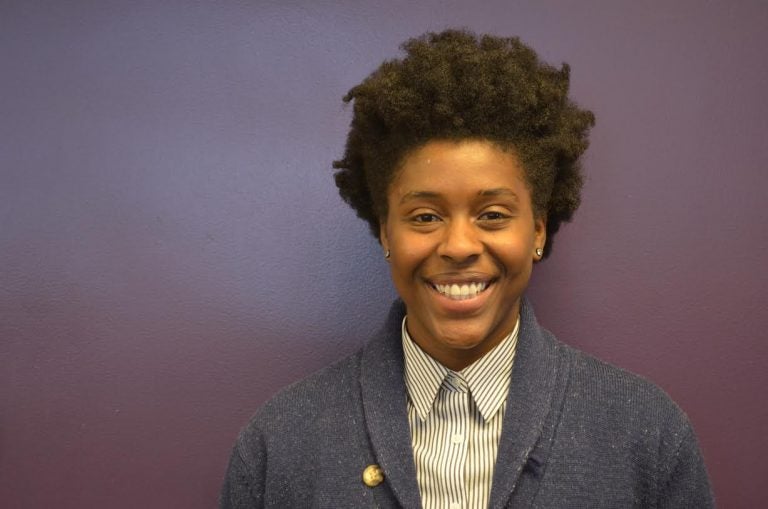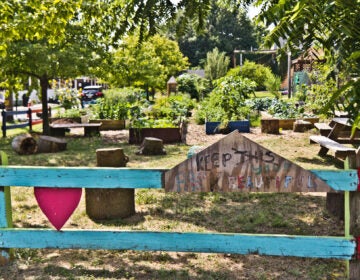Philly names first-ever farm czar
Richards got their start as a planner in New York, where they facilitated the creation of an urban farm cooperative lead by Black and Latinx Bronx residents.

Ashley Richards will be the city's first urban agriculture director. (Courtesy of the City of Philadelphia)
This story originally appeared on PlanPhilly.
—
Philadelphia has named city planner Ashley Richards as its first-ever urban agriculture director. Richards will direct the creation and implementation of Philadelphia’s forthcoming urban agriculture plan.
Richards got their start as a planner in New York, where they facilitated the creation of an urban farm cooperative led by Black and Latinx Bronx residents. Most recently, Richards was working for the Philadelphia City Planning Commission on development issues in North Philadelphia.
Richards, a graduate of the University of Pennsylvania’s city planning program, also served as co-chair of the city’s Food Policy Advisory Council Urban Agriculture subcommittee. Their new role will be based in the Parks and Recreation Department and linked to its urban agriculture program, FarmPhilly. Richards was unable to comment for this article.
“It’s very exciting,” said Jenny Greenberg, executive director of Neighborhood Garden Trust (NGT), a land trust affiliated with the Pennsylvania Horticultural Society that acquires and preserves community gardens in Philadelphia. “They’re very committed on these issues.”
Greenberg hopes the urban agriculture master plan will produce a better system for gardeners and urban farmers to secure the land they’ve been tending for years, sometimes generations.
The seeds for the plan were planted about three years ago at a city council hearing where residents asked the city to step up with a long-term strategy to support new and long-tenured community gardens and urban farms.
Nearly half of the city’s estimated 470 farms operate on formerly blighted land that the farmers don’t own or control. The squatter farmers often cleaned up vacant eyesore lots and turned them into safe places to grow food. These spaces have become green respites in neighborhoods with little access to fresh food and high rates of crime. Studies have shown such spaces reduce crime, improve health and increase land values.
But as real estate appreciates and some neighborhoods gentrify, many farmers have found themselves locked out of the land they made bloom. One North Philadelphia family recently filed a lawsuit against the city over a community garden behind their home that was sold at a sheriff’s sale, according to the Philadelphia Inquirer. The family transformed the abandoned land into a community space and tended it for nearly 40 years before the city sold it, the Inquirer reported.
Reporter Catalina Jaramillo explains why growers who claimed Philly’s abandoned lots as community gardens have no clear pathway to permanent ownership — yet on Wednesday’s episode of WHYY’s The Why. Listen now and subscribe on Apple Podcasts or Stitcher.
For growers who don’t have a clear title to the land they are tending, acquiring rights can be complicated and costly. The planning process Richards was tapped to lead is intended to address this problem, among others.
Christine Knapp, director of the city’s office of sustainability, said she hopes the plan will help the city coordinate between agencies that work with community gardens and those that control public land such as the Philadelphia Land Bank, so the city can expand its urban agriculture practices in a way that works better for everyone.
In addition to creating a framework for expanding urban agriculture in the city, the plan will explore how “to better support those gardens that have been out there for a long time,” Knapp said.
The city expects to select a vendor to begin working on the plan in June and have it ready in 18 months or less for a budget capped at $120,000. A request for proposals closes on April 30.
More land earmarked for gardens
One year ago, Public Interest Law Center attorney Ebony Griffin was frustrated with the city’s process for transferring vacant land into the hands of community gardens.
“The Land Bank is not really responsive,” Griffin said. “It almost feels like it’s a facade.”
In a recent interview, Griffin said things have improved.
“I can tell that they’ve really put forth some effort into making sure that they’re addressing the needs of the growing community. And I do think that a lot of our initial concerns could be attributed to the fact that they were in transition and they were a little short-staffed,” Griffin said.
Griffin’s organization recently updated a website — Grounded in Philly — with information about how to navigate the legal process to secure garden land. The online resource includes tools for growers to communicate and organize online.
It’s not only growers trying to get organized. Between last April and now, a few things have changed at the Land Bank. The staff grew by two, from a team of 15 to 17 — and they’ve begun to hit some of the agency’s internal targets. For instance, the agency acquired 20 properties for community gardens in the last fiscal year, meeting a goal.
But progress remains slow and incremental.
Last year’s goal was to transfer 33 lots to garden groups. Only four made the jump in ownership — all four going to the Neighborhood Gardens Trust.
This year’s goal is 40. But so far only one garden sale has been approved but not yet settled — the formerly at-risk New Jerusalem farm.
“The challenge is that the real estate market is moving faster than the city’s bureaucracy, and politics and policy,” said NGT’s Greenberg.“We are in a race, it feels like, in a lot of neighborhoods.”
The four parcels Greenberg’s group acquired from the Land Bank came in addition to 15 from the Philadelphia Redevelopment Agency and five from the city’s Department of Public Property. Another five tax-delinquent properties will soon be transferred from the Land Bank to the trust, according to Greenberg.
Justin Trezza, director of garden programs at PHS, said the numbers reflect progress.
“I think we’re seeing a positive trend right now,” said Trezza, whose group already supports about 150 gardens around the city. “The Land Bank is making a concerted effort to make their processes clear for individuals. And then, beyond that, there has been a lot of other individuals and entities putting pressure on the City Council to be more supportive of community gardens.”
Kirtrina Baxter is with Soil Generation, a Black and Brown-led coalition of growers and the Public Interest Law Center. She said there is still work to be done.
“It hasn’t gotten any better,” Baxter said. “The [Land Bank’s] strategic plan wasn’t done in 2018 so we still don’t have any transparency around how the Land Bank is being used to service gardens. Outside of the work that they do with NGT, there’s really nothing to show for that.”
Last year, Baxter and her coalition organized rallies demanding community control of gardens, farms, and green spaces throughout Philadelphia. This year, they’re looking closely at the City Council election. Through Philly’s tradition of councilmanic prerogative, council representatives have a lot of control over how city-owned land is used or sold. Soil Generation is calling its followers to vote only for “green friendly” candidates, or those who have been supportive of gardens.
Baxter also has her hopes on the urban agricultural plan coming up this year.
“Once the city hears back and gets the strategic plan back from the community, saying these are the things and these are the services that we want, these are the supports that we want — then hopefully they’ll move in a different way to support gardens better,” Baxter said.
WHYY is your source for fact-based, in-depth journalism and information. As a nonprofit organization, we rely on financial support from readers like you. Please give today.







